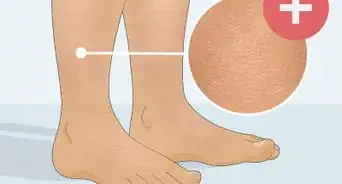This article was co-authored by Paul Friedman, MD. Paul Friedman, MD, is a Board-Certified Dermatologist, and the Director and Founder of the Dermatology & Laser Surgery Center in Houston, Texas. He has over 25 years of experience and specializes in Mohs micrographic surgery, dermatologic laser surgery, and cosmetic dermatology. Dr. Friedman is the current President of the American Society for Laser Medicine & Surgery and was named by Newsweek Magazine as one of the Best Dermatologists in America for Laser Treatments. His awards include the Husk Prize for his research in dermatologic surgery and the Young Investigator's Writing Competition Award of the American Society for Dermatologic Surgery. Dr. Friedman completed his dermatology residency at the New York University School of Medicine and received his medical degree with the highest honors from the University of Tennessee Health Science Center, College of Medicine.
There are 7 references cited in this article, which can be found at the bottom of the page.
wikiHow marks an article as reader-approved once it receives enough positive feedback. In this case, 80% of readers who voted found the article helpful, earning it our reader-approved status.
This article has been viewed 444,295 times.
Dry skin has a low level of sebum and can be prone to sensitivity. The skin has a parched look caused by its inability to retain moisture. It usually feels "tight" and uncomfortable after washing unless some type of moisturizer or skin cream is applied. Chapping and cracking are signs of extremely dry, dehydrated skin.
Steps
Maintaining Moisture
-
1Maintain your natural oils. Your body naturally produces oils that keep your skin protected and prevent drying out. However, you do lots of things throughout the day that remove these natural oils. The biggest threat to your skin's natural protectant is your bathing routine. Soaps which remove to much oil from your skin and water which is too hot both put your skin at risk. Lower the temperature of your showers as low as you can stand and use only soaps which contain moisturizers or are marked for "sensitive skin".[1]
- You should also be sure not to bathe too often or for too long. Both can also wash away too much of your natural oil. Shower for no more than 10-15 minutes and no more than once a day. If you can, bathe only every other day.
-
2Exfoliate gently. You have probably seen the advice to exfoliate dry skin. This removes the dead skin, preventing infection and allowing moisturizing products to absorb properly. This is good advice but you should follow it carefully.[2] You don't want to exfoliate too often, first of all. Once or twice a week can be plenty, especially for sensitive areas like the face. You also shouldn't use harsh exfoliants, like a loofah or pumice stone. Instead, baking soda paste or a clean washcloth will get the job done without causing damage.
- It is also important to make sure the washcloth you use is clean. One of the reasons why things like loofahs cause problems is because items like that easily harbor germs and bacteria. Using a clean washcloth can help keep that problem from happening.
Advertisement -
3Dry your skin carefully. When you dry your skin, be careful. Vigorous rubbing with a towel can not only irritate your skin, it can also remove too much moisture and oil. This can cause dryness or make an existing problem worse. Instead, air dry when you can and otherwise lightly pat your skin dry with a soft, clean towel or cloth.
-
4Apply a moisturizer. After you bathe or get your skin wet, you should always apply a layer of moisturizer to help lock in moisture and return the natural oils that you may have removed.[3] This basic layer does not need to be thick, necessarily. Just a basic layer of protection can make a difference.[4]
- Lanolin cream is one of the best products for protecting your skin and maintaining moisture. This is a natural product which is produced by animals to protect their own skin. The most common US brand is called Bag Balm and can be found in most drug stores.
- For your face, however, lanolin can be a bit much and should be used only occasionally and in very severe cases. Otherwise, you should use a lighter product which is oil free and designed not to block pores or cause other skin problems.
-
5Apply a thicker layer at night. If you can, try to apply a thicker layer of product at night, and then cover the area in clothing to protect the product. This will give your skin more to absorb and more time to absorb it. Be aware, however, than most of these skin moisturizing products stain, so be sure to cover the skin with clothing that you don't worry about, like an old pair of sweats or pajamas.
Protecting Your Skin
-
1Moisturize regularly. If you want to have real results that last, it's important to form a routine. You'll need to moisturize and care for your skin regularly and for a long time before you can see real results. Be consistent, persistent, and above all: patient. You will see results but you need to be sure to moisturize every day for a really long time.
-
2Protect your skin from the cold. When the air gets cold, it precipitates moisture out of the air. The air then sucks whatever moisture it can get out of your skin, causing dryness. This is why you are probably most affected in the winter. Protect your skin from the temperatures by covering up in warm clothing and by covering your skin in cremes to lock in the moisture you have.[5]
- For example, wear gloves to protect your hands and socks to protect your feet. Scarves and cowls can be worn across the face to protect your skin there.
-
3Protect your skin from the sun. The sun also causes problems with dry skin, by irritating your skin and causing damage. You also risk skin cancer by getting too much sun exposure. Be sure to wear protective clothing as much as you can when you go out on a sunny day and for what skin is not covered by clothing, use sunscreen.
- SPF 1000 sunscreen is just not needed. The regular sunscreen, 15 or 30, should be plenty.[6] You will want to be sure, though, to get a broad spectrum sunscreen (UVA/UVB).
-
4Use a mild soap. Some soaps, especially those with high levels of synthetic surfactants are really harsh on your skin and can cause damage and dryness. You'll want to find a mild soap, that suits your skin, in order to prevent dryness.[7]
-
5Check your home for hard water. Hard water, or water which contains a large concentration of calcium, is common throughout the world. This excess calcium ( which not technically harmful) can irritate and dry out your skin, however, by leaving some calcium behind on your skin. You should have your home tested for hard water to see if this is causing your skin problems.
- If you do have hard water, it's possible to treat the water so that it comes out of the pipes calcium-free. Your local hardware store should be able to help with this.
-
6Maintain a healthy humidity in your home. Just like dry winter air is bad for you, any kind of dry air can also cause dry skin. You can combat this by using a humidifier in your home or office. A basic place to start would be running one in your room at night, since this will also help you sleep.[8]
Going Beyond the Skin Itself
-
1Drink more water. Dehydration can cause problems with dry skin very easily so you'll want to be sure that you're drinking plenty of water. However, how much is the right amount depends on each individual. The recommended eight glasses is a starting point, but you might need more or you might need less.
- A good rule of thumb is that if your urine is coming out pale or clear, you're getting enough water. If it's sunshiny yellow or darker, you need to drink more water.
-
2Get the right nutrients in your diet. Your skin, just like so many other parts of your body, needs some nutrients more than others in order to look its best.[9] You'll want to be sure to get these nutrients in your diet or take supplements to make sure that your body has enough. The best nutrients for skin include vitamin A, vitamin E, and omega-3 fatty acids.[10]
- You can find these nutrients in high concentrations in salmon, anchovies, sardines, olive oil, almonds, kale, and carrots.
-
3Combat obesity and related conditions which can cause dryness. It is well established by science that dry skin can often be caused by excess weight and obesity. Conditions that are related to obesity, such as diabetes, can also cause skin dryness. If you find that other methods are not helping you to maintain healthy skin, you might want to consider if your weight and general health are the root cause of your problem.[11]
-
4Watch out for underlying health conditions. Other underlying health problems can also cause dry skin. You'll want to talk with your doctor and get evaluated to see if any of these problems are affecting you. If they are, then you'll know why your own efforts haven't been very successful and you'll have new options available to you to help keep your skin healthy.
- Eczema and psoriasis, for example, are common conditions which both cause problems with dry skin.
- If you find you have dry skin on your face and around your hairline, it's important to realize that it might actually be dandruff and caused by a skin fungus. This requires different treatment than just moisturizing.
-
5Talk to your doctor. As with most medical problems, if you have questions or concerns it's a good idea to talk to your doctor. Dry skin is a problem that should not be ignored. Severely dry skin causes small and large cracks in the skin, which puts you at serious risk of infection. Dry skin can also, as stated above, be associated with more severe health problems like diabetes. For these reasons, it's a good idea not to ignore the problem if you find that the measures discussed above are not helping.[12]
- If you don't have health insurance and you live in the US, please see the official listings of clinics which can help you at low or no cost.
Expert Q&A
-
QuestionHow can I take care of dry skin on my face?
 Paul Friedman, MDPaul Friedman, MD, is a Board-Certified Dermatologist, and the Director and Founder of the Dermatology & Laser Surgery Center in Houston, Texas. He has over 25 years of experience and specializes in Mohs micrographic surgery, dermatologic laser surgery, and cosmetic dermatology. Dr. Friedman is the current President of the American Society for Laser Medicine & Surgery and was named by Newsweek Magazine as one of the Best Dermatologists in America for Laser Treatments. His awards include the Husk Prize for his research in dermatologic surgery and the Young Investigator's Writing Competition Award of the American Society for Dermatologic Surgery. Dr. Friedman completed his dermatology residency at the New York University School of Medicine and received his medical degree with the highest honors from the University of Tennessee Health Science Center, College of Medicine.
Paul Friedman, MDPaul Friedman, MD, is a Board-Certified Dermatologist, and the Director and Founder of the Dermatology & Laser Surgery Center in Houston, Texas. He has over 25 years of experience and specializes in Mohs micrographic surgery, dermatologic laser surgery, and cosmetic dermatology. Dr. Friedman is the current President of the American Society for Laser Medicine & Surgery and was named by Newsweek Magazine as one of the Best Dermatologists in America for Laser Treatments. His awards include the Husk Prize for his research in dermatologic surgery and the Young Investigator's Writing Competition Award of the American Society for Dermatologic Surgery. Dr. Friedman completed his dermatology residency at the New York University School of Medicine and received his medical degree with the highest honors from the University of Tennessee Health Science Center, College of Medicine.
Board Certified Dermatologist, American Board of Dermatology Make sure you apply moisturizer daily to help keep your skin smooth and hydrated.
Make sure you apply moisturizer daily to help keep your skin smooth and hydrated. -
QuestionHow do I treat dry lips?
 Community AnswerExfoliate your lips with sugar and Vaseline or brush them with your toothbrush and put Vaseline on them. Make sure to use lip balm regularly to keep your lips moisturized.
Community AnswerExfoliate your lips with sugar and Vaseline or brush them with your toothbrush and put Vaseline on them. Make sure to use lip balm regularly to keep your lips moisturized. -
QuestionWhat is the best foundation for dry skin?
 Community AnswerTry a bb cream instead of foundation, bb cream is very moisturizing and doesn't become cakey like a foundation would.
Community AnswerTry a bb cream instead of foundation, bb cream is very moisturizing and doesn't become cakey like a foundation would.
Warnings
- Never use hot water when cleansing dry skin.⧼thumbs_response⧽
- Don't use a washcloth because a rough texture can irritate.⧼thumbs_response⧽
References
- ↑ https://www.mayoclinic.org/diseases-conditions/dry-skin/diagnosis-treatment/drc-20353891
- ↑ Paul Friedman, MD. Board Certified Dermatologist, American Board of Dermatology. Expert Interview. 8 April 2020.
- ↑ Paul Friedman, MD. Board Certified Dermatologist, American Board of Dermatology. Expert Interview. 8 April 2020.
- ↑ https://www.mayoclinic.org/diseases-conditions/dry-skin/diagnosis-treatment/drc-20353891
- ↑ https://www.aad.org/skin-care-basics/dermatologists-tips-relieve-dry-skin
- ↑ Paul Friedman, MD. Board Certified Dermatologist, American Board of Dermatology. Expert Interview. 8 April 2020.
- ↑ http://www.ncbi.nlm.nih.gov/pubmed/12207765
- ↑ https://www.aad.org/skin-care-basics/dermatologists-tips-relieve-dry-skin
- ↑ Paul Friedman, MD. Board Certified Dermatologist, American Board of Dermatology. Expert Interview. 8 April 2020.
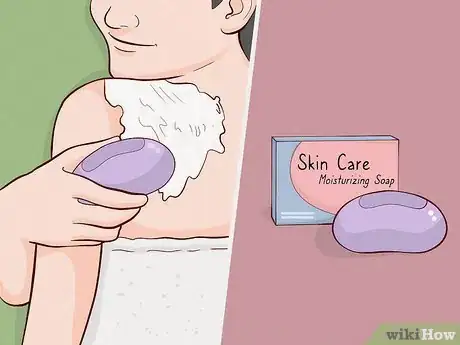
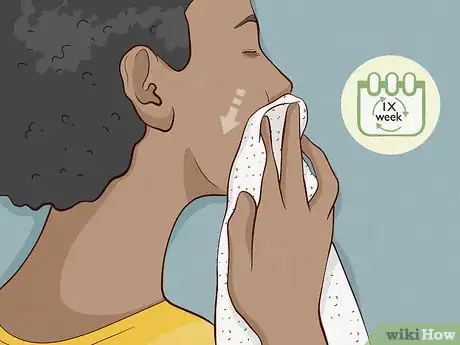

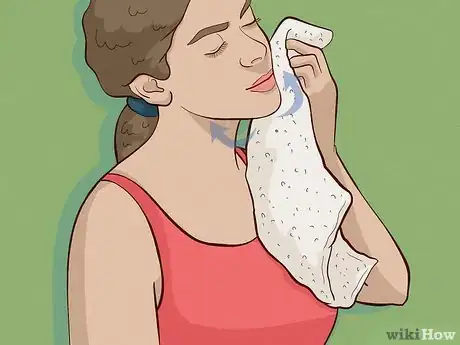
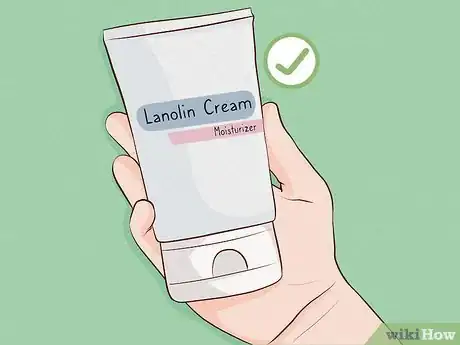
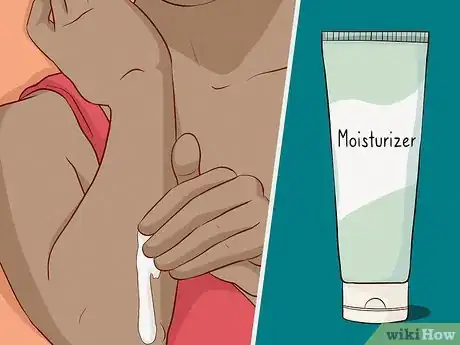
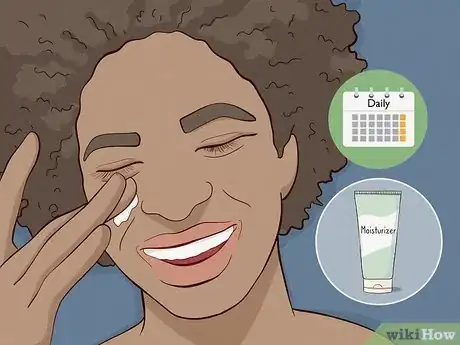

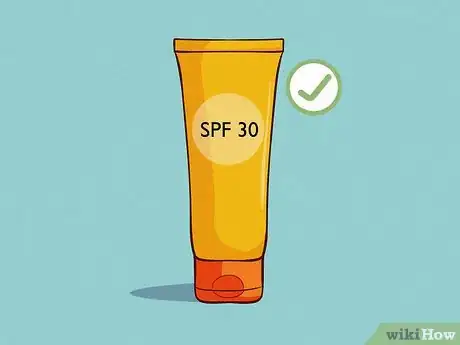
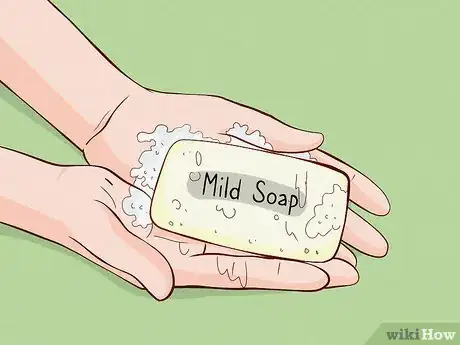
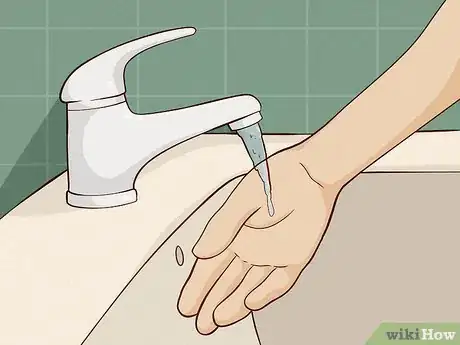
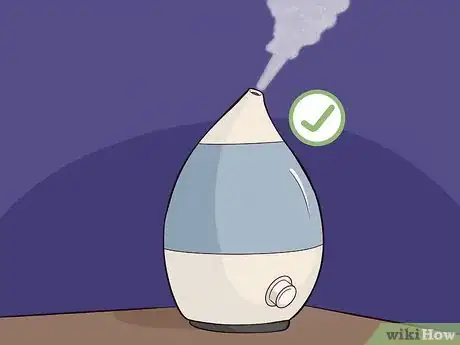



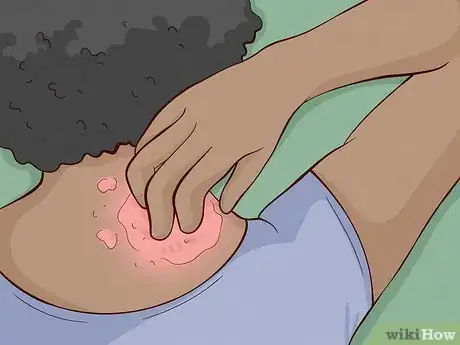


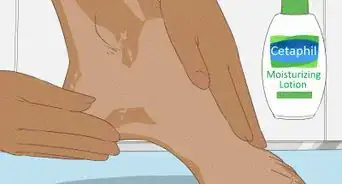


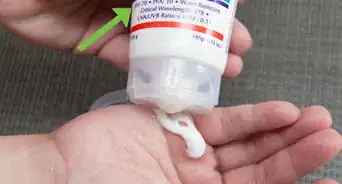
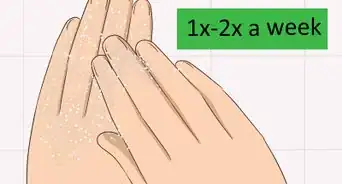
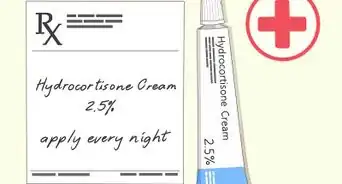

-Step-8-Version-3.webp)
